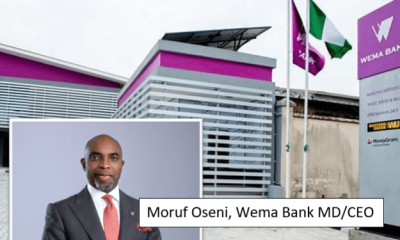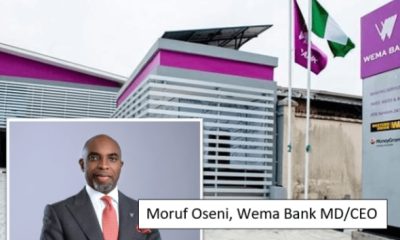Business
Wema Bank’s Rights Issue and Share Price Rally: Rewarding Investor Confidence

Wema Bank’s Rights Issue and Share Price Rally: Rewarding Investor Confidence
In December 2023, Wema Bank started a substantial rights issue, offering 8,572,103,573 ordinary shares at N4.66 per share, based on a two-for-three ratio for existing shareholders as of September 28, 2023.
The surge in Wema Bank’s share prices following the rights issue in December suggests a boost in investor confidence.
This positive sentiment is likely fueled by expectations surrounding the promised utilization of proceeds, the bank’s past performance, and optimistic outlook.
Back story
On September 28, 2023, the closing share price stood at N4.85. The rights issue, priced at N4.66 per share, presented a discount of N0.19 per share or 3.92%.
By the close of trading on December 29, 2023, the share price had increased to N5.60, marking an increase of N0.94 per share or 20.17%.
The upward trajectory continued, with the share price reaching N12 by the close of trading on Friday, January 19, 2024, marking the highest level since 2018.
This outstanding performance resulted in a year-to-date gain of 114%, surpassing the 2023 full-year year-to-date gain of 43.59%.
Generally, while short-term gains are promising, which may be attributed in part to a shift towards specific asset classes with relatively better returns, such as investors flocking to equity assets to counter negative real return, a critical analysis of the bank’s sustainability and its ability to uphold and extend this positive momentum becomes imperative.
More insights
The sustainability of this momentum can be tied to how effectively the bank deploys the proceeds from the rights issue.
The bank had explicitly stated in the rights issue circular its intention to allocate 89.82% of the proceeds from the rights issue towards expanding its loan portfolio, specifically targeting the retail, commercial, and SME sectors.
The bank should adhere to this commitment and execute the planned deployment to realize the anticipated benefits and uphold investor confidence.
One anticipated key impact of the rights issue deployment is the enhancement of Wema Bank’s relatively small franchise within the banking sector.
Currently, the bank’s total assets constitute only 2% of both the banking system assets and loans and advances to customers as at the end of Q3 2023.
More so, the bank’s profitability is observed to be below that of its peers. This is evident in its 9M 2023 reported pre-tax profit of N22.117 billion, accounting for approximately 1% of the listed banks’ pre-tax profit for the first nine months of 2023.
The anticipated expansion in the bank’s loan portfolio is expected to have a positive impact on its financial metrics, particularly on net interest income and net interest margin.
The decline in net interest margin by 8.82% year-on-year to 6.2% in the 9M of 2023 highlights the current challenge.
Furthermore, a sincere deployment of the rights issue proceeds is expected to strengthen the bank’s balance sheet, enhance shareholders’ fund and have a positive effect on the bank’s regulatory capital ratios.
In alignment with this perspective, Fitch Ratings, in its June 2023 report, explicitly affirmed that the rights issue, when completed, would exert a significant positive impact on the bank’s regulatory capital ratios.
Since the landmark 2005 bank recapitalization in Nigeria, which raised the minimum paid-up capital from N2 billion to N25 billion, the landscape of Nigerian banks has evolved significantly.
As of the end of the third quarter in 2023, none of the banks listed on the Nigeria Exchange Limited (NGX) had attained the N25 billion share capital threshold, despite boasting substantial shareholders’ funds.
Among them, FBNH led with a share capital of N17.948 billion, followed closely by Access Holding Company at N17.773 billion.
In this context, Wema Bank’s current share capital of N6.429 billion and shareholders’ fund of N118.558 billion would potentially increase to about N46 billion and N159 billion, respectively, with fully realized proceeds.
This improvement in Tier-1 capital would boost the capital adequacy ratio, currently at 13.31%.
However, there are notable downside risks that demand the bank’s close attention.
The persistent volatility in the exchange rate poses a significant challenge, as it has the potential to erode both the real and dollar values of the capital requirements.
What you should know
The expansion in the loan portfolio resulting from the rights issue, particularly in an elevated risk environment characterized by Naira devaluation, high inflation, and interest rates, may lead to increased loan impairment losses and a rise in the cost of funds.
The bank’s cost of funds has already increased by 17% YoY to 5.4%, primarily attributed to a hike in the Monetary Policy Rate (MPR).
Albeit the overarching goal remains investor returns and increased shareholders’ value. While an initial dip in return on average equity is possible due to increased share outstanding without commensurate growth in earnings, it is expected that the bank will improve its earnings, starting with a critical examination of its cost structure.
The bank’s cost-to-income ratio, although showing a 13% reduction to 71.11% in 9M 2023, remains relatively high compared to industry standards, standing as one of the highest in the banking sector.
The bank’s share price presents an attractive investment opportunity, offering a favorable return with an impressive industry-wise dividend yield of 5.36% and an inflation-protected earning yield of 31.50%.
Additionally, the stock appears relatively undervalued, evident in its relatively low trailing earnings multiple of 3.17x.
Given the heightened investor confidence, it is necessary for the bank to consider rewarding stakeholders. A sustained focus on cost optimization, effective risk management, and delivering on the promised utilization of funds are imperative.
These measures will not only strengthen investor confidence but also contribute to continuous growth, increased shareholder value, and long-term success.
Business
Federal Mortgage Bank of Nigeria disburses N440 billion, delivers 39,000 homes since 1993 – Shehu Osidi

Federal Mortgage Bank of Nigeria disburses N440 billion, delivers 39,000 homes since 1993 – Shehu Osidi
The Federal Mortgage Bank of Nigeria (FMBN) has revealed it has disbursed N440 billion and delivered approximately 39,000 new homes under the National Housing Fund (NHF) scheme since its re-establishment in 1993.
This achievement was highlighted by the bank’s Managing Director and Chief Executive, Mr. Shehu Osidi, during his presentation at the 18th Africa International Housing Show in Abuja.
His presentation, titled “Financing the Housing We Need: A New Dawn at FMBN as an Institutional Enabler,” detailed the bank’s accomplishments in housing finance.
Osidi noted that, in addition to the N440 billion disbursed and the 39,000 new homes delivered, FMBN has provided around 25,500 mortgages and extended over 120,000 micro-housing loans, all offered under a single-digit interest rate lending regime.
“Since its re-establishment in 1993, the Bank has delivered about 39,000 new homes, about 25,500 mortgages and over 120,000 micro housing loans, all within a single-digit interest rate lending regime.
“Under the National Housing Fund (NHF) Scheme, it has registered 26,350 organisations and over 5.8 million cumulative contributors with over 1 million accounting for the self-employed sector.
“The Bank has disbursed the cumulative of N440 billion under its various loan windows to drive affordable housing finance for the Nigerian economy,” Osidi said.
Additionally, the FMBN Managing Director disclosed that in compliance with the provisions of the National Housing Fund Act, the bank has refunded N84.8 billion to 492,604 contributors who exited the scheme.
More insights
Highlighting more achievements of the Federal Mortgage Bank of Nigeria (FMBN), Osidi noted the recovery of N12 billion from the Federal Ministry of Finance.
This recovery was part of the N19 billion in wrongful deductions of National Housing Fund (NHF) contributions, which had been previously misconstrued as revenue under the 40% deduction regime. He further mentioned that FMBN continues to engage with relevant authorities to halt these deductions and recover the remaining balance of the trapped NHF funds.
Additionally, he explained that FMBN has expanded its loan products from mortgage financing to include housing construction, micro-housing financing, and rent-to-own options. New additions such as Home Improvement and Rent Assistance loans specifically target the non-salaried informal sector.
Osidi highlighted that the bank’s clientele now includes primary mortgage banks, real estate developers, housing cooperatives, and individual NHF contributors. Despite modest numbers, he emphasized that FMBN remains a key player in the housing sector.
He also outlined the executive management’s seven-point agenda, which focuses on enhancing automation, promoting cost efficiency, improving credit quality, effective project management, and expanding strategic partnerships to transform FMBN into a responsive and reliable institution.
Business
Analysis: Fidelity Pension Managers 2023 audited company and fund accounts

Analysis: Fidelity Pension Managers 2023 audited company and fund accounts
Fidelity Pension Managers recently published its 2023 audited accounts, providing a summary overview of its financial health and fund performance.
This report provides a summary review and presents key financial highlights, financial ratios, fund performance, and the trend in the number of Retirement Savings Account (RSA) holders.
Financial Highlights
Total Revenue: Total revenue for the company rose 23% to ₦2.59 billion in 2023, up from ₦2.1 billion in 2022. From the reports, this increase is attributed majorly to higher fee income generated from the pension funds it has under management.
Profit After Tax (PAT): PAT rose 26% to ₦666 million, up on the previous year’s 21% rise.
Operating Expenses: Operating expenses rose slower than revenue and PAT by 22% to ₦1.76 billion from ₦1.44 billion, leading to a slight drop in the company’s cost-to-income ratio, which fell to 67.98% from 68.57%. The company seems to be relatively prudently managing financial resources, amidst rising costs and inflationary pressures.
Shareholder’s Funds: The company’s shareholders funds ended the year at ₦5.95 billion in 2023 up 5% from the ₦5.64 billion in 2022.
Return on Equity (ROE): ROE was a very low 11.21%. Whilst this is a slight improvement on 2022’s 9.41%, the company does not seem to be efficiently deploying shareholders’ equity to generate profits.
Financial and Fund Highlights

Corporate Audited Annual Results

Financial Ratios

Fund Performance Highlights
RSA Funds Performance: Fidelity Pensions offers six of the seven regulated RSA pension funds to the public. Notably, all six funds put in a better performance than the previous year, whilst only four funds out-performed the industry benchmark returns (see our article on benchmark returns here).

5-Year Audited Pension Funds Performance

Number of RSA Holders
RSA Growth: The growth in the number of RSA holders was another highlight of the year. Fidelity Pension Managers saw an increase of 2.48% in RSA holders, adding 8,005 new accounts to close the year at 331,124 RSA holders.


Demographic Analysis
Age Distribution: The majority of 330,000 RSA holders (83.9%) registered in 2023 fell within the age bracket of <30 years to 39 years, indicating a young and growing industry subscriber base. Of the 2023 registrations, Fidelity Pension Managers recorded 2.43% of this growth.

Conclusion
Fidelity Pension Managers has demonstrated improved financial growth in 2023, marked by increased revenue, higher profitability, and a growing RSA customer base. However, the company remains constrained by low assets under management, which limits its fee-generating potential. To overcome this challenge, Fidelity Pension Managers must focus on enhancing the performance of the funds it manages and attracting more RSA holders. Improved fund performance will not only benefit current RSA holders but also make Fidelity Pensions an attractive option for those looking to transfer their pensions.
Business
Zenith Bank maintains its position as Nigeria’s top bank in terms of Tier-1 capital for the 15th consecutive year.

Zenith Bank maintains its position as Nigeria’s top bank in terms of Tier-1 capital for the 15th consecutive year.
Zenith Bank Plc for fifteenth consecutive year has retained its position as the Number One Bank in Nigeria by Tier-1 Capital in the 2024 Top 1000 World Banks’ Rankings, published by The Banker Magazine.
This ranking places Zenith Bank Plc as the 565th Bank globally with a Tier-1 Capital of $2.01 billion. The rankings, published in the July 2024 edition of The Banker Magazine of the Financial Times Group, United Kingdom, recognise Zenith Bank’s continued financial strength and stability.
They are based on the 2023 year-end Tier-1 capital of banks globally and remain the primary source for global bank financials used by most international organisations in their assessments of banks.
Tier-1 Capital describes capital adequacy, the core measure of a bank’s financial strength from a regulator’s perspective. According to the ranking, Tier-1 Capital, as defined by the latest Bank for International Settlements (BIS) guidelines, includes loss-absorbing capital, i.e., common stock, disclosed reserves, retained earnings, and minority interests in the equity of subsidiaries that are less than wholly owned. A strong Tier-1 capital ratio boosts investor and depositor confidence, indicating the Bank is well-capitalised and financially stable.
Commenting on this achievement, the Group Managing Director/CEO of Zenith Bank Plc, Dame (Dr.) Adaora Umeoji, OON, said, “We are deeply honoured to be recognised as the Number One Bank in Nigeria by Tier-1 Capital for the fifteenth consecutive year.
“This recognition is a testament to our strategic focus on sustainable growth, innovation, and customer satisfaction. It also emphasises our resilience and strength in navigating the ever-evolving financial landscape.
“Our dedicated team of professionals has remained steadfast in ensuring that we maintain our position at the forefront of the banking industry.” She extended her profound and sincere appreciation to the Founder and Chairman, Dr. Jim Ovia, CFR, whose visionary and transformative leadership has played a pivotal role in cultivating a resilient and thriving establishment.
“She also expressed her deep appreciation for the board’s insightful governance, the staff’s relentless dedication, and the unwavering loyalty of the bank’s esteemed customers to the Zenith brand.
Zenith Bank’s financial performance for the year was driven by a remarkable triple-digit growth of 125% in gross earnings, from N945.6 billion reported in 2022 to N2.132 trillion in 2023.
This growth led to an improved market share in both the retail and corporate segments despite a persistently challenging macroeconomic environment. The increase in gross earnings was primarily due to growth in interest and non-interest income. Interest income growth was attributed to the increase in the size of risk assets and their effective repricing, while non-interest income was driven by significant trading gains and gains from the revaluation of foreign currencies.
Zenith Bank recently commenced recapitalisation efforts with the conclusion of its Capital Markets Day held on 11th July 2024. It aims to raise the least amount of capital amongst its peers at N230 billion, considering it already maintains a robust capital base of N270.7 billion.
The Bank remains dedicated to supporting the growth of the Nigerian economy and providing its numerous customers with innovative and efficient banking solutions.
Zenith Bank’s track record of excellent performance has continued to earn the brand numerous awards, with these latest accolades coming on the heels of several recognitions. These include being recognised as the Number One Bank in Nigeria by Tier-1 Capital for the fourteenth consecutive year in the 2023 Top 1000 World Banks Ranking, published by The Banker Magazine.
The Bank was also awarded the Bank of the Year (Nigeria) in The Banker’s Bank of the Year Awards for 2020 and 2022; and Most Sustainable Bank, Nigeria in the International Banker 2024 Banking Awards.
Further recognitions include Best Bank in Nigeria for three consecutive years from 2020 to 2022 in the Global Finance World’s Best Banks Awards and Best Commercial Bank, Nigeria for three consecutive years from 2021 to 2023 in the World Finance Banking Awards.
Additionally, Zenith Bank has been acknowledged as the Best Corporate Governance Bank, Nigeria, in the World Finance Corporate Governance Awards for 2022 and 2023, and ‘Best in Corporate Governance’ Financial Services’ Africa for four consecutive years from 2020 to 2023 by the Ethical Boardroom.
The Bank’s commitment to excellence saw it being named the Most Valuable Banking Brand in Nigeria in the Banker Magazine Top 500 Banking Brands for 2020 and 2021, and Retail Bank of the Year for three consecutive years from 2020 to 2022 at the BusinessDay Banks and Other Financial Institutions (BAFI) Awards.
The Bank also received the accolades of Most Sustainable Bank, Nigeria, in the International Banker 2023 Banking Awards, Best Commercial Bank, Nigeria and Best Innovation in Retail Banking, Nigeria, in the International Banker 2022 Banking Awards.
Zenith Bank was named Bank of the Decade (People’s Choice) at the ThisDay Awards 2020, Bank of the Year 2021 by Champion Newspaper, Bank of the Year 2022 by New Telegraph Newspaper, and Most Responsible Organisation in Africa 2021 by SERAS Awards.
-

 News2 years ago
News2 years agoWhat Led Us To Choose Peter Obi As Our Candidate?-Middlebelt Forum
-

 BREAKING NEWS10 months ago
BREAKING NEWS10 months agoKey Insights for the Upcoming 2023/2024 UEFA Champions League Campaign
-

 Entertainment9 months ago
Entertainment9 months agoTaylor Swift Skips Travis Kelce’s Big Game to Prepare for ‘Eras Tour’
-

 News6 months ago
News6 months agoPaul Agbonze Obazele Addresses Labor Party Leaders in Edo Central Senatorial District
-

 BREAKING NEWS11 months ago
BREAKING NEWS11 months agoVan Gaal Alleges 2022 World Cup Rigged in Favor of Messi and Argentina
-

 News1 year ago
News1 year ago“New King of Serie A,” Tinubu hails Osimhen on winning the Serie A Title
-

 BREAKING NEWS12 months ago
BREAKING NEWS12 months agoBayern Munich Engages in Discussions for the Acquisition of David De Gea from Manchester United
-

 News2 years ago
News2 years agoHappy 62nd Anniversary of Nigeria’s Independence!



















